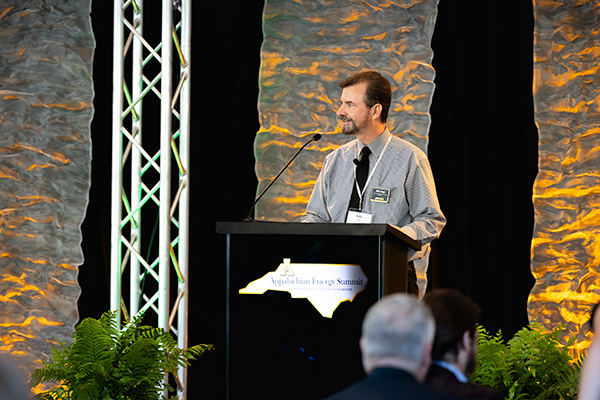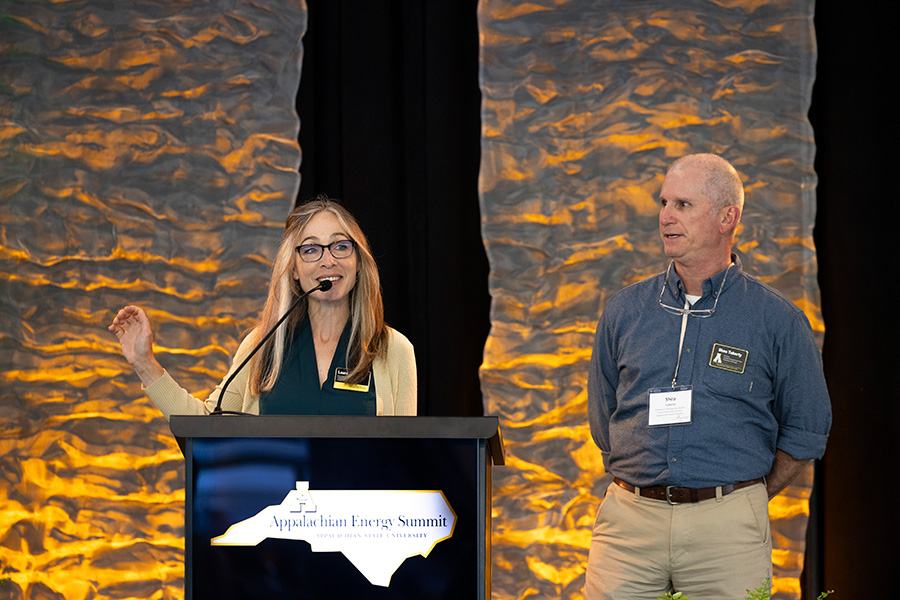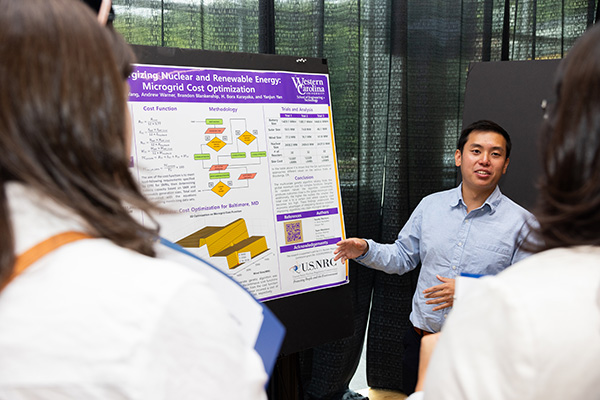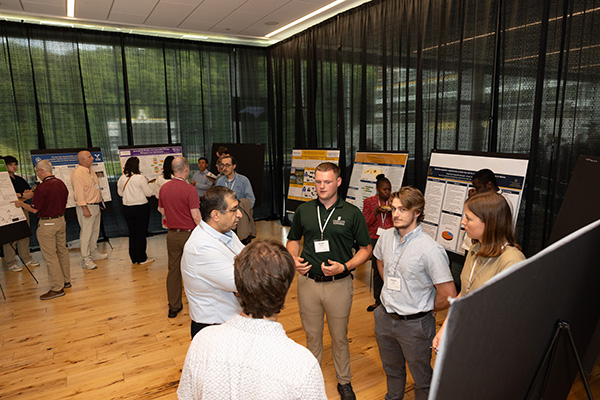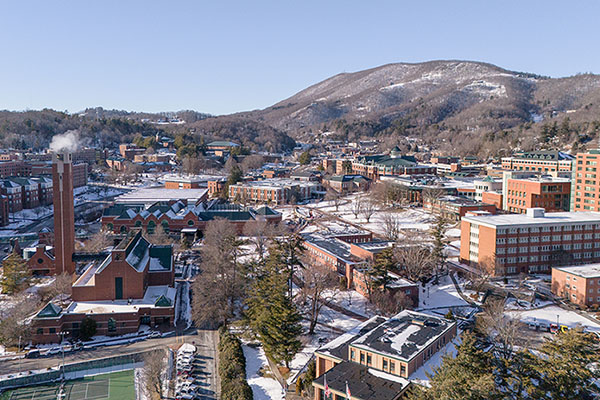BOONE, N.C. — Appalachian State University, along with 12 other state agencies, universities and community colleges, has been recognized by the North Carolina Department of Environmental Quality (NCDEQ) for significantly reducing its energy use since 2002–03. App State’s 48% reduction in energy use per square foot — reported at the university’s 13th annual Appalachian Energy Summit — continues to surpass the state’s goal of at least 40% compared to 2002–03 fiscal year levels.
At the Energy Summit, held in June at App State’s Boone campus, Department of Environmental Quality representatives reported that the state is well on its way to achieving — and most likely exceeding — $2 billion in avoided energy costs by 2025. Since the 2002–03 academic year, the University of North Carolina System and its partners have collectively avoided $1.96 billion in energy costs.
“North Carolina’s state agencies and our partners in higher education are leading the way in reducing energy use in state facilities, setting an example of both environmental and fiscal stewardship of state resources,” said NCDEQ Secretary Elizabeth S. Biser in a department press release recognizing the energy reduction awardees.
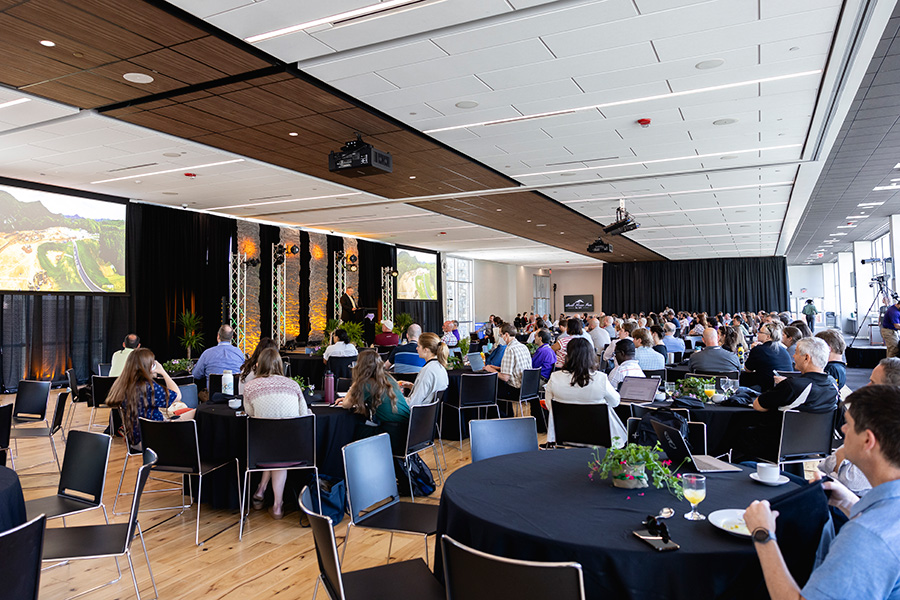
At App State's 13th annual Appalachian Energy Summit, North Carolina energy leaders reported that the UNC System and its partners have collectively avoided $1.96 billion in energy costs since the 2002–03 academic year. The state is on track to exceed the goal of $2 billion in avoided energy costs by 2025. App State has achieved a 48% reduction in energy use per square foot since 2002–03, exceeding the state's energy reduction goal of 40%. This achievement was recognized by the NC Department of Environmental Quality in July. Photo by Chase Reynolds
Energy Summit highlights successes — and work that remains
Nearly 200 government officials, industry leaders, educators and students from across the state participated in the two-day summit, held June 3–4 — sharing ideas and putting into action ecological, financial and social processes designed to improve energy efficiency across the UNC System, the state and beyond. The annual event, envisioned by App State and hosted by the university since 2012, is organized by the Office of Sustainability.
“The 2024 Appalachian Energy Summit was a great exhibition of the current efforts underway by the leaders of North Carolina — and an inspiration for what is possible,” said Mike Kapp, interim director of the Office of Sustainability at App State.
The university has achieved $64.5 million in avoided energy costs and $17.3 million in avoided water use costs since 2002–03, for a combined total of more than $81 million in utility savings, according to App State Energy Manager Jonathan Pierson.
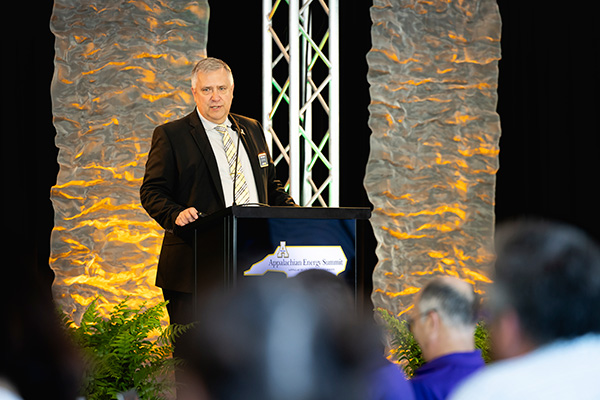
App State Associate Vice Chancellor of Facilities Management Nick Katers gives a presentation on the university’s Innovation District during the 2024 Appalachian Energy Summit, held June 3–4 on the Boone campus. The district’s facilities will be powered by a zero-carbon energy system. Photo by Kyla Willoughby
“It’s important to celebrate these successes — and to highlight the significant work that remains,” said Pierson. “App State’s efforts to enhance campus energy efficiency and increase its commitment to renewable energy are ongoing and will require continued dedication to meet the state’s energy and sustainability goals.”
This summit’s keynote speaker, Katrin Klingenberg, co-founder and executive director of Phius (Passive House Institute U.S.), gave a presentation on her more than 20 years of work in driving the adoption and development of passive building and net zero energy standards in the U.S. According to Phius, Passive building uses core building principles to create safe, resilient, comfortable and energy-efficient buildings — net-zero structures that utilize clean, renewable energy sources to generate as much or more energy than they consume annually.
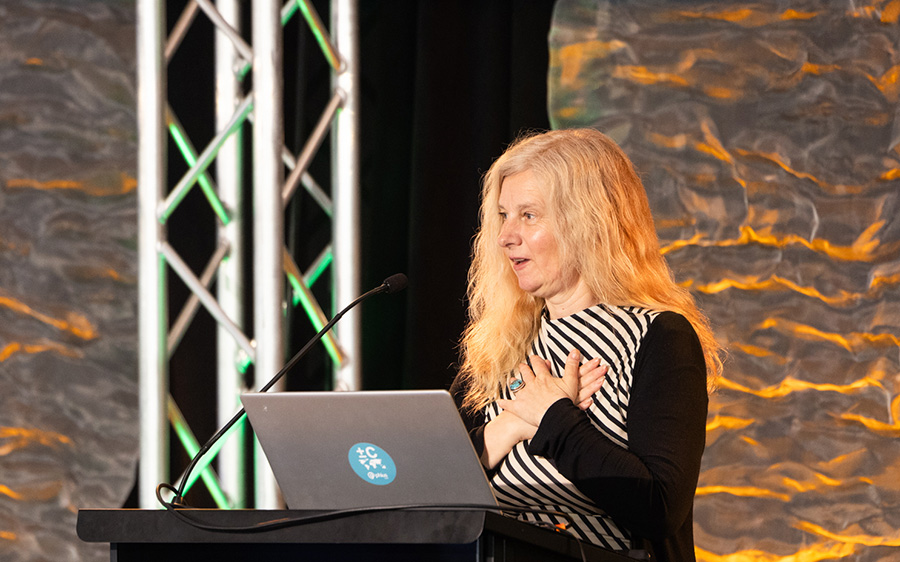
Katrin Klingenberg, co-founder and executive director of Phius (Passive House Institute U.S.), gives the keynote address at the 2024 Appalachian Energy Summit, held June 3–4 on App State’s Boone campus. Klingenberg presented on her more than 20 years of work in driving the adoption and development of passive building and net zero energy standards in the U.S. Photo by Chase Reynolds
“Given that almost half of all energy consumed in the United States is due to building operations and construction, it is incredibly important for us to prioritize energy efficiency first on our path to reduce carbon emissions,” Kapp said.
“We hope this year’s summit focus on energy efficiency and building science provides all state institutions with tangible tools for decreasing their energy consumption, which aids in reducing carbon dioxide emissions — a known catalyst of climate change,” said Kapp.
Several working groups met to discuss energy topics such as campus-based energy efficiency, transportation-oriented opportunities, pathways toward zero waste and high-performance campus design, and 22 speakers, including App State faculty, staff and students, took part in the summit’s opening and closing sessions.
Session topics for this year’s summit included:
- An update on recycling efforts across the state from Delaney King, community recycling specialist at the North Carolina Department of Environmental Quality.
- App State’s Innovation District, presented by Associate Vice Chancellor of Facilities Management Nick Katers. The district will feature a zero-carbon energy system that will begin to transition the Boone campus away from steam power.
- An overview of App State’s five-year Quality Enhancement Plan, “Pathways to Resilience,” provided by QEP directors and App State faculty Dr. Shea Tuberty and Laura England. The QEP aims to prepare students to address climate resilience needs and opportunities across multiple disciplines in their future careers.
- Engaging App State students in global climate policy through the Walker College of Business’ UN Climate Negotiations Program — presented by professor Dr. Dave McEvoy, chair of the Department of Economics, and App State alumnae Mia Altieri ’24 and Grace Gliwa ’24.
The event also featured a student poster competition, with undergraduate and graduate students from across the state presenting their energy-related research or projects. Cash prizes were awarded for the top posters in the undergraduate and graduate categories.
Undergraduate and graduate students from across North Carolina presented their energy-related research or projects as part of the 2024 Appalachian Energy Summit’s student poster competition. Cash prizes were awarded for the top posters in the undergraduate and graduate categories. Photo by Chase Reynolds
What do you think?
Share your feedback on this story.
‘Pathways to Resilience’ QEP to launch this fall
About Sustainability and Energy Management at App State
Appalachian State University’s leadership in sustainability is known nationally. The university’s holistic, three-branched approach considers sustainability economically, environmentally and equitably in relationship to the planet’s co-inhabitants. The university is an active steward of the state’s interconnected financial, cultural and natural resources and challenges students and others think critically and creatively about sustainability and what it means from the smallest individual action to the most broad-based applications. The university offers both undergraduate and graduate academic degree programs that focus on sustainability. In addition, 100 percent of Appalachian’s academic departments offer at least one sustainability course or course that includes sustainability, and all students graduate from programs that have adopted at least one sustainability learning outcome. Learn more at https://appstate.edu/sustainability.
About Appalachian State University
As a premier public institution, Appalachian State University prepares students to lead purposeful lives. App State is one of 17 campuses in the University of North Carolina System, with a national reputation for innovative teaching and opening access to a high-quality, cost-effective education. The university enrolls more than 21,000 students, has a low student-to-faculty ratio and offers more than 150 undergraduate and 80 graduate majors at its Boone and Hickory campuses and through App State Online. Learn more at https://www.appstate.edu.

